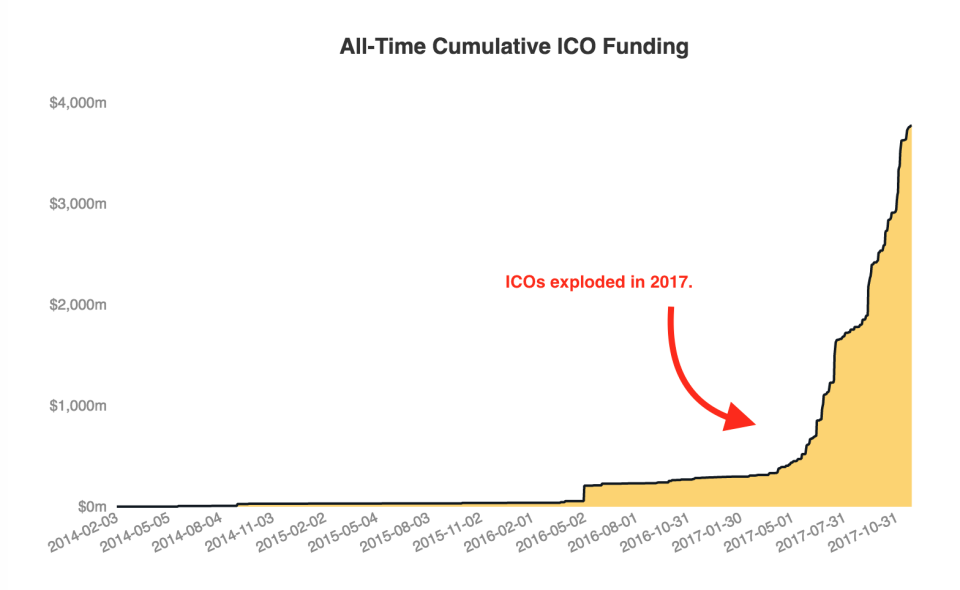Be aware: An ICO is not like an IPO
Nearly $4 billion in funding has now been raised through initial coin offerings (ICOs), according to a handy ICO tracker at CoinDesk.
In news articles, you might have seen ICOs described in terms of traditional IPOs. Many define an ICO as a “digital IPO” or, as Bloomberg wrote in October, “like an ICO but with digital coins.”
That’s not correct.
In an ICO or “token sale,” an internet startup sells you digital tokens it has created, for later use in their ecosystem. Investors typically buy the new token with existing cryptocurrencies like ether or bitcoin, or with US dollars. There is no guarantee the token you’re buying will accrue value, nor even a guarantee that the product or network the company is planning will ever launch.
Here’s the key difference from an IPO: If you buy tokens in an ICO, you get no equity in the company. You have no ownership stake, no voting rights, nothing like the privileges you get from being a shareholder in a publicly traded company. The tokens are not akin to shares. They may hypothetically rise in value based on the success of the company, but they may not, even if the company is successful. And the company owes you no real commitment.
Think of an ICO as buying chips for use at a casino that hasn’t opened yet. (In fact, for one example, here’s a company that did an ICO for that very purpose, an online betting platform.)

In ICOs, new internet companies see a fast way to raise capital, and investors see an instant entry into cryptocurrency. But investor beware: ICOs are extremely risky, and many are likely fraudulent.
Most of the companies doing token sales have not yet launched a product, just put out a white paper on what they intend to launch. And they run targeted ads on social media often designed to attract newbies with scant information and promises of big returns. (See the ad below, which a Reddit user called the “worst ICO ad ever.”)

CoinList, recently spun out of AngelList, is a services provider for ICOs that says it vets planned ICOs carefully and only partners with those that it believes are legitimate and above-board. The first ICO that CoinList listed was for Filecoin, which raised more than $250 million in August, setting a new ICO record. The second-biggest token sale was Tezos, which raised more than $230 million.
“If the company is doing it as a way to raise non-diluted financing because they see it as the only opportunity, that’s maybe not the best fit,” says CoinList CEO Andy Bromberg.
Indeed, many of the companies doing ICOs are doing an ICO for that reason: to get money quickly. It isn’t very similar at all to a company debuting on the public market by listing its stock ticker on the NYSE or Nasdaq.
Just this month, SEC Chairman Jay Clayton issued a warning to the public about investing in ICOs. “There is substantially less investor protection than in our traditional securities markets,” he said. And Stefan Thomas, CTO of Ripple, predicts the death of the ICO in 2018.
As the influential venture capitalist Tim Draper said this year at Web Summit conference, “Safety is not in the ICO vocabulary. If you’re investing in ICOs, you better understand the entire cycle of the coin, the token. Is there a real use for it, is there a reason to buy it?”
Joseph Lubin, a cofounder of Ethereum, said on the same panel, “People who are interested in buying a utility token should be buying that utility token for the usage of the platform that it enables.”
And above all else, you should not go into one thinking it is like an IPO.
—
Daniel Roberts covers bitcoin and blockchain at Yahoo Finance. Follow him on Twitter at @readDanwrite.
Read more:
Everything you need to know about initial coin offerings
Tim Draper: ‘Safety is not in the ICO vocabulary’
CoinList wants to bring safety to ICOs
Japan is poised to become the leading bitcoin market
Why China’s central bank fears bitcoin
Why Ethereum is the hottest new thing in digital currency
